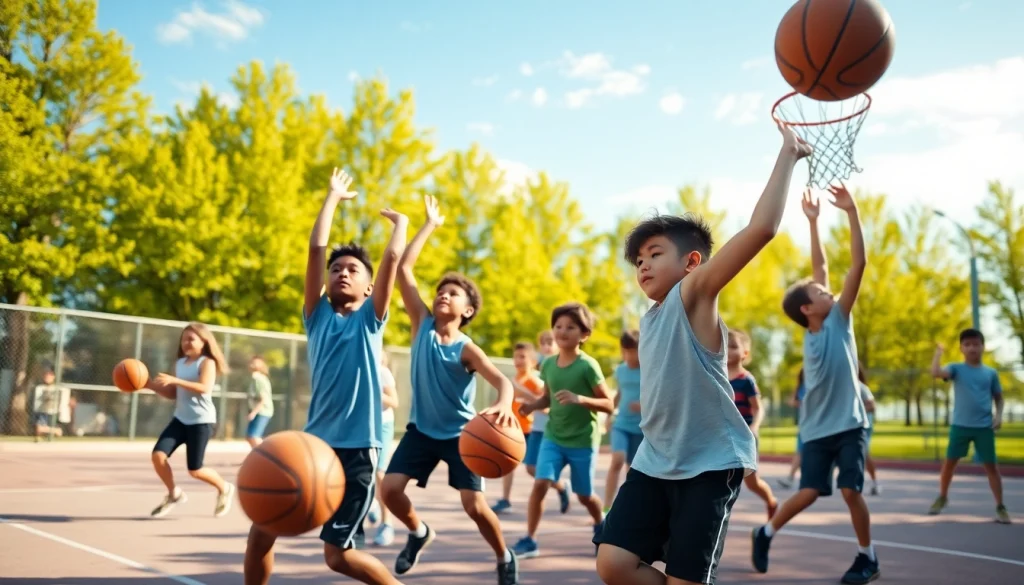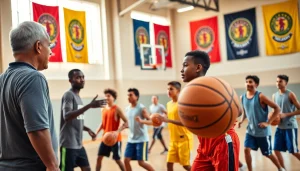
1. Importance of Basketball for Young Enthusiasts
Basketball stands as one of the most popular sports globally, captivating the hearts and minds of millions. For young basketball enthusiasts, it serves not merely as a game, but as a conduit for personal growth, social interaction, and lifelong memories. Understanding the significance of basketball extends beyond just the scoreboard; it’s about the transformative journey each player undertakes both on and off the court.
1.1 Benefits of Playing Basketball
Engaging in basketball presents a myriad of benefits. Firstly, it fosters physical fitness. Regular practice enhances cardiovascular health, concentration, and coordination. Research indicates that youth participating in team sports are less likely to be obese and more likely to maintain optimal health throughout their lives.
Moreover, basketball hones discipline and time management skills as athletes juggle practice, games, and academic responsibilities. The rigorous nature of training teaches young players to set and achieve personal goals, which is pivotal for academic success and future career endeavors.
1.2 Physical and Emotional Growth
Playing basketball isn’t just about physical enhancement; it nurtures emotional resilience too. The sport provides opportunities to handle pressure, cope with failures, and celebrate achievements, thereby promoting mental toughness. The emotional highs and lows experienced during games teach valuable lessons about persistence and growth in adversity.
Furthermore, basketball instills a strong sense of teamwork and community. Players learn to work collaboratively, communicate effectively, and support one another, reinforcing interpersonal skills that are essential both in sports and life.
1.3 Building Lifelong Friendships
One of the most rewarding aspects of being involved in basketball from a young age is the friendships formed through shared experiences. Teammates often develop bonds that last a lifetime, based on mutual respect and collective struggle. These relationships can turn into invaluable networks, providing support throughout college and professional pursuits, reinforcing social connections well into adulthood.
2. Skills Development for Young Basketball Enthusiasts
To excel in basketball, particularly for young enthusiasts, systematic skills development is imperative. It is not only about innate talent but also about cultivating specific capabilities and understanding the fundamentals of the game. A well-rounded skill set empowers young players to adapt to various game situations and increases their chances for success in competitive environments.
2.1 Fundamental Skills Every Player Should Master
Every player, regardless of age, needs to master a set of basic skills to thrive. Dribbling, for instance, forms the cornerstone of play, enabling players to advance the ball while navigating opponents. Shooting, both from close range and beyond the arc, is essential in a game heavily marked by scoring capabilities. Defensive skills such as positioning and footwork are equally critical as they contribute significantly to a player’s overall effectiveness on the court.
Additionally, passing skills cannot be overlooked. Effective communication and sending accurate passes are crucial for maintaining ball movement and creating scoring opportunities. Young players should always work on developing their two-handed passing techniques to broaden their gameplay versatility.
2.2 Advanced Techniques to Enhance Gameplay
As players progress, so too must their skills. Advanced techniques include mastering the pick-and-roll, which is fundamental in creating spaces and scoring opportunities. Understanding how and when to set picks can exponentially increase a player’s contribution to the team’s dynamics.
Furthermore, shot fakes and hesitations are vital tools that young players can use to create their shot opportunities or drive past defenders. These techniques can make a substantial difference in tighter games where every score counts.
2.3 Importance of Coaching and Mentoring
As young players navigate their basketball journey, coaching and mentoring become pivotal. Effective coaches don’t just teach skills; they also serve to inspire and motivate young athletes, fostering self-belief and resilience. A good coach can have a profound effect on a player’s development, providing personalized feedback and fostering a growth mindset.
Moreover, the importance of mentorship extends beyond the court. Role models who take the time to uplift young players can reinforce core values such as hard work, dedication, and authenticity, which are essential for success in sports and life.
3. Community Programs and Resources
The significance of community playing a role in developing young basketball enthusiasts cannot be overstated. Local programs and resources not only facilitate skill development but also promote inclusion and community spirit.
3.1 Local Basketball Camps and Clinics
Basketball camps and clinics have proliferated across the nation, offering intensive training tailored for young players. These events allow participants to immerse themselves in the sport, receive expert coaching, and improve their skills in a focused manner. Historically, camps serve as a crucible for developing young talent, many of whom go on to achieve remarkable accolades in basketball.
In choosing a basketball camp, young athletes should consider factors such as the coach-to-player ratio, the curriculum offered, and the overall reputation of the camp. Engaging in drills that focus on individual and team skills provide an excellent opportunity for young athletes to elevate their capabilities.
3.2 Scholarships and Support for Aspiring Players
For many young basketball enthusiasts, financial constraints can pose hurdles to participation in basketball programs. Fortunately, numerous scholarships and financial aid opportunities abound for talented players. Organizations such as the NBA, local sports clubs, and community foundations frequently sponsor initiatives aimed at ensuring that promising basketball players receive the resources they need to succeed.
Parents and guardians are encouraged to actively seek and apply for such scholarships, ensuring that aspiring players can pursue their passions without financial burden.
3.3 Building Strong Community Networks
Successful basketball programs also cultivate strong community networks that foster support. By bringing together parents, coaches, and local businesses, basketball organizations can create a symbiotic environment where everyone collaborates to enhance the development of young players. This community-centered approach strengthens the social fabric and creates a sustainable ecosystem that nurtures prowess while encouraging community engagement.
4. Role Models in Basketball
Role models play a crucial role in the development of young basketball enthusiasts. They provide inspiration, serve as exemplars of success, and often influence young players’ aspirations from early on.
4.1 Famous Young Players to Look Up To
Figures such as Luka Dončić and Zion Williamson have emerged as modern-day icons among young basketball enthusiasts. Their journeys serve as compelling narratives that emphasize hard work and dedication. Young players can draw valuable lessons from their stories, toiling through challenges that transformed them into excellent athletes.
Moreover, each of these players displays attributes like sportsmanship and teamwork, showcasing that success is not merely measured by statistics but also through collaboration and respect for the game.
4.2 Inspirational Stories from the Court
Throughout basketball history, there are innumerable stories of players overcoming adversity. Whether fighting personal challenges or familial hardship, these narratives serve as powerful motivational tools. Players like Michael Jordan, who faced rejection and failure only to rise to the pinnacle of professional sports, inspire young enthusiasts to keep pushing forward despite their setbacks.
Inspiring documentaries and books narrate these tales, giving young fans relatable heroes to emulate. These stories remind young players that perseverance and a dedicated attitude can lead to greatness.
4.3 How Role Models Influence Young Enthusiasts
Having relatable role models can impact the trajectory of young players’ aspirations. It shows them that their goals are achievable. Role models often motivate young athletes to practice, improve their skills, and adopt disciplined routines that are critical for success.
Additionally, the philanthropic efforts of these athletes often remind young basketball enthusiasts about their responsibilities toward giving back to the community, thus promoting values of kindness and altruism.
5. Engaging Parents and Families in Youth Basketball
Family involvement in youth basketball is paramount to a child’s experience. Encouragement from parents lends support, reinforces responsibility, and cultivates a love for the game, creating a nurturing atmosphere that allows young players to flourish.
5.1 Encouraging Participation and Support
Parents should actively engage in their children’s basketball journeys. This involves attending games, helping them practice, and even volunteering in coaching roles. When parents show interest in their children’s activities, the kids perceive their support as validation of their efforts, ultimately boosting their confidence.
Furthermore, encouraging children to invite their friends to play creates a welcoming environment. This peer involvement can lead to enhanced social interactions and a more enjoyable experience overall.
5.2 Organizing Family-Friendly Events
Organizing family-friendly basketball events fosters community and allows families to bond over their shared love for basketball. Events such as barbeque nights at the courts, family tournaments, or skills challenges can enhance enthusiasm and create memories that last a lifetime. These gatherings also serve to build camaraderie among parents, fostering a sense of belonging and support from the broader basketball community.
5.3 Creating a Positive Sport Environment
Creating a positive sports environment is essential for young basketball enthusiasts to thrive. This involves ensuring that competition is healthy and fun, where sportsmanship is prioritized over winning at all costs. Coaches and parents must model these behaviors, teaching young athletes valuable life lessons about respect, humility, and resilience.
Moreover, encouraging young players to appreciate their progress, irrespective of outcomes, creates a nurturing atmosphere that motivates them to work harder while enjoying the game they love.






